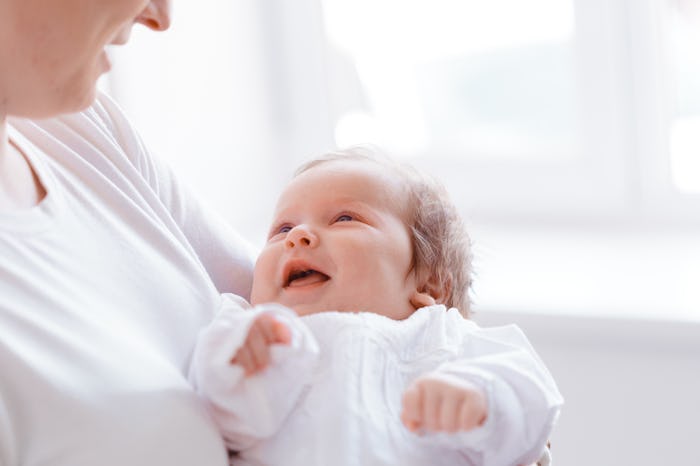Life

Here's How Successful Rocking Your Baby To Sleep Really Is
Babies don't come with a guidebook or instruction manual, so most of us are just muddling through this whole parenting thing and hoping for the best. Despite the inevitable blunders we're sure to make, though, there are some parts of parenting that seem to come naturally. For example, give any mother a baby and the first thing she'll probably do is sway back and forth. But does rocking your baby to sleep actually work? Sure, it feels like a natural reflex and can certainly be soothing, but us parents have our priorities, and at the top of that coveted priority list is sleep.
According to 2013 study in Current Biology, all babies are calmed when held by their mother and even regardless of species. The study goes on to highlight just how powerful contact between a mother and child can be, stating, "Maternal touch and rhythmic rocking (vestibular-proprioceptive stimulation) is calming to human infants."
Researchers also found that when the rocking is simulated by a robot or automated system, the calming effects are reduced when compared to rocking that's simulated by a human being. In short, you just can't beat the real thing when it comes to hugs and sways and cuddles from mom.
Some baby sleep experts suggest that although rocking your baby in your arms is very soothing and relaxing, it may not be a good idea to rely solely on this technique when attempting to get your baby to sleep for a significant amount of time. The Mayo Clinic warns that this method doesn't help your baby learn how to self-soothe or fall asleep by themselves. In fact, the clinic goes on to recommend you stop rocking your baby when they're drowsy, but not yet asleep, and setting them in their sleep space.
"Avoid holding, rocking, or feeding your baby to sleep. Eventually, this might be the only way your baby is able to fall asleep."
Nicole Johnson from the Baby Sleep Site says that any baby sleep routine — including being rocked, using a pacifier, drinking a bottle, or nursing — isn't problematic in itself. Issues can arise, however, if your baby is unable to fall asleep without this prop, especially if they wake in the night and are inconsolable without their sleep aide. Johnson explains in greater detail, saying, "The problem with sleep associations lies in the fact that your bay needs YOU to recreate the environment in which they fall asleep."
Even if the official advice may suggest parents shouldn't rock their babies to sleep, this natural nurturing behavior is almost impossible to suppress. Plus, rocking your baby to sleep does work, so it's likely to be a habit many new, sleep-deprived, exhausted moms will be more than happy to keep. I say do what you have to do, moms.